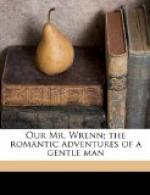“Gee!” he mused, “I’d like to know if Jake is handling my work the way we—they—like it. I’d like to see the old office again, and Charley Carpenter, just for a couple of minutes. Gee! I wish they could have seen me put it all over Pete to-night! That’s what I’m going to do to the blooming Englishmen if they don’t like me.”
The S.S. Merian panted softly beside the landing-stage at Birkenhead, Liverpool’s Jersey City, resting in the sunshine after her voyage, while the cattle were unloaded. They had encountered fog-banks at the mouth of the Mersey River. Mr. Wrenn had ecstatically watched the shores of England—England!—ride at him through the fog, and had panted over the lines of English villas among the dunes. It was like a dream, yet the shore had such amazingly safe solid colors, real red and green and yellow, when contrasted with the fog-wet deck unearthily glancing with mist-lights.
Now he was seeing his first foreign city, and to Morton, stolidly curious beside him, he could say nothing save “Gee!” With church-tower and swarthy dome behind dome, Liverpool lay across the Mersey. Up through the Liverpool streets that ran down to the river, as though through peep-holes slashed straight back into the Middle Ages, his vision plunged, and it wandered unchecked through each street while he hummed:
“Free, free, in Eu-ro-pee, that’s me!”
The cattlemen were called to help unload the remaining hay. They made a game of it. Even Satan smiled, even the Jewish elders were lightly affable as they made pretendedly fierce gestures at the squat patient hay-bales. Tim, the hatter, danced a limber foolish jig upon the deck, and McGarver bellowed, “The bon-nee bon-nee banks of Loch Lo-o-o-o-mond.”
The crowd bawled: “Come on, Bill Wrenn; your turn. Hustle up with that bale, Pete, or we’ll sic Bill on you.”
Bill Wrenn, standing very dignified, piped: “I’m Colonel Armour. I own all these cattle, ’cept the Morris uns, see? Gotta do what I say, savvy? Tim, walk on your ear.”
The hatter laid his head on the deck and waved his anemic legs in accordance with directions from Colonel Armour (late Wrenn).
The hay was off. The Merian tooted and headed across the Mersey to the Huskinson Dock, in Liverpool, while the cattlemen played tag about the deck. Whooping and laughing, they made last splashy toilets at the water-butts, dragged out their luggage, and descended to the dock-house.
As the cattlemen passed Bill Wrenn and Morton, shouting affectionate good-bys in English or courteous Yiddish, Bill commented profanely to Morton on the fact that the solid stone floor of the great shed seemed to have enough sea-motion to “make a guy sick.” It was nearly his last utterance as Bill Wrenn. He became Mr. Wrenn, absolute Mr. Wrenn, on the street, as he saw a real English bobby, a real English carter, and the sign, “Cocoa House. Tea Id.”




